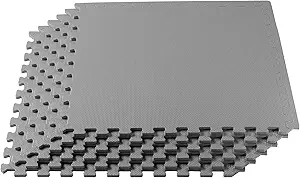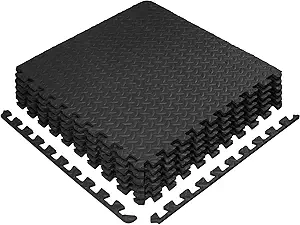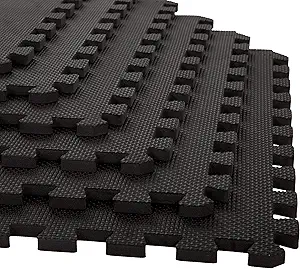The Ultimate Buying Guide for Foam Floor Tiles: Types, Key Considerations, Features, Prices, Tips, and FAQs
Overview
Foam floor tiles are a versatile and affordable flooring option for a variety of settings, from home gyms and playrooms to basements and outdoor spaces. With so many options on the market, it can be overwhelming to choose the right foam floor tiles for your needs. In this buying guide, we'll break down the different types of foam floor tiles, key considerations to keep in mind when shopping, important features to look for, typical prices, helpful tips, and frequently asked questions.
Types
1. Interlocking foam tiles: These tiles are designed to fit together like puzzle pieces, making them easy to install and customize to any space. They come in a variety of thicknesses and colors, and are ideal for home gyms, playrooms, and other high-traffic areas.
2. Exercise mats: These foam mats are typically thinner and more portable than interlocking tiles, making them a great option for yoga studios, dance studios, and other fitness spaces. They can also be used as a cushioned surface for stretching and other low-impact exercises.
3. Gym flooring: For more heavy-duty gym settings, gym flooring options like rubber tiles or rolls may be more appropriate. However, foam gym flooring is a more affordable and comfortable option that can still provide adequate protection and support.
4. Play mats: Foam floor tiles can also make great play mats for young children. Look for non-toxic options that are easy to clean and can withstand spills and rough play.
5. Outdoor foam tiles: If you're looking for a soft and safe surface for an outdoor play area or patio, outdoor foam tiles can provide a comfortable and slip-resistant surface that can withstand the elements.
Key Considerations
1. Thickness: The thickness of foam floor tiles can vary widely, from 1/4 inch to 1 inch or more. Thicker tiles will provide more cushioning and support, but may also be more expensive.
2. Material: Most foam floor tiles are made from EVA foam, which is lightweight, durable, and non-toxic. However, some cheaper options may be made from lower-quality materials that can break down over time or release harmful chemicals.
3. Size and coverage: Consider the size of the space you need to cover, and how many tiles you'll need to achieve adequate coverage. Some foam floor tiles come in packs of 4 or 6, while others are sold individually.
4. Color and design: Foam floor tiles come in a variety of colors and designs, so you can choose a style that matches your decor or adds a pop of color to your space.
Features
1. Non-slip surface: Look for foam floor tiles with a non-slip surface to prevent falls and injuries.
2. Waterproof: If you'll be using foam floor tiles in a damp or humid environment, such as a basement or outdoor space, look for waterproof options that won't absorb moisture.
3. Easy to clean: Foam floor tiles can get dirty quickly, especially in high-traffic areas. Look for tiles that are easy to wipe clean or that can be easily removed and washed.
4. Shock absorption: Foam floor tiles can provide shock absorption to protect your joints and reduce fatigue during exercise or play.
Prices
Foam floor tiles can range in price from as little as $0.50 per square foot to over $5 per square foot, depending on the thickness, material, and brand. On average, you can expect to pay between $1 and $3 per square foot for good-quality foam floor tiles.
Tips
1. Measure your space carefully before purchasing foam floor tiles to ensure you buy the right amount.
2. Consider buying extra tiles to keep on hand in case of damage or wear and tear.
3. Look for foam floor tiles with a warranty or satisfaction guarantee to ensure you're getting a quality product.
4. If you're using foam floor tiles in a high-traffic area, consider using a rug or mat on top to protect the tiles and prolong their lifespan.
FAQs
Q: Can foam floor tiles be used outdoors?
A: Yes, there are foam floor tiles specifically designed for outdoor use that can withstand the elements.
Q: Are foam floor tiles easy to install?
A: Yes, most foam floor tiles are designed to be easy to install and can be done without any special tools or equipment.
Q: Can foam floor tiles be cut to fit around obstacles?
A: Yes, foam floor tiles can be easily cut to fit around corners, poles, and other obstacles using a sharp utility knife.
Q: Are foam floor tiles safe for children?
A: Yes, as long as you choose non-toxic foam floor tiles that are free from harmful chemicals, they can be a safe and comfortable flooring option for children.
Q: How do I clean foam floor tiles?
A: Most foam floor tiles can be easily wiped clean with a damp cloth or mop. For tougher stains, you can use a mild soap and water solution.
Conclusion:
Foam floor tiles can be a great option for a variety of settings, from home gyms and playrooms to outdoor spaces and beyond. By considering the different types, key considerations, features, prices, tips, and FAQs outlined in this buying guide, you'll be well-equipped to choose the perfect foam floor tiles for your needs.














